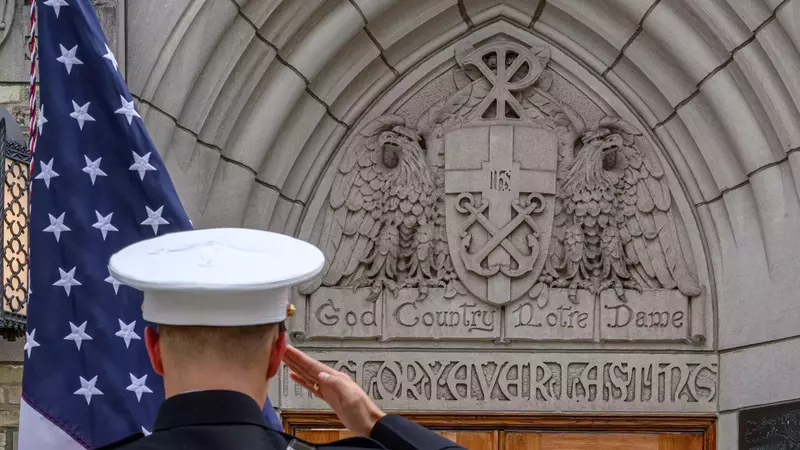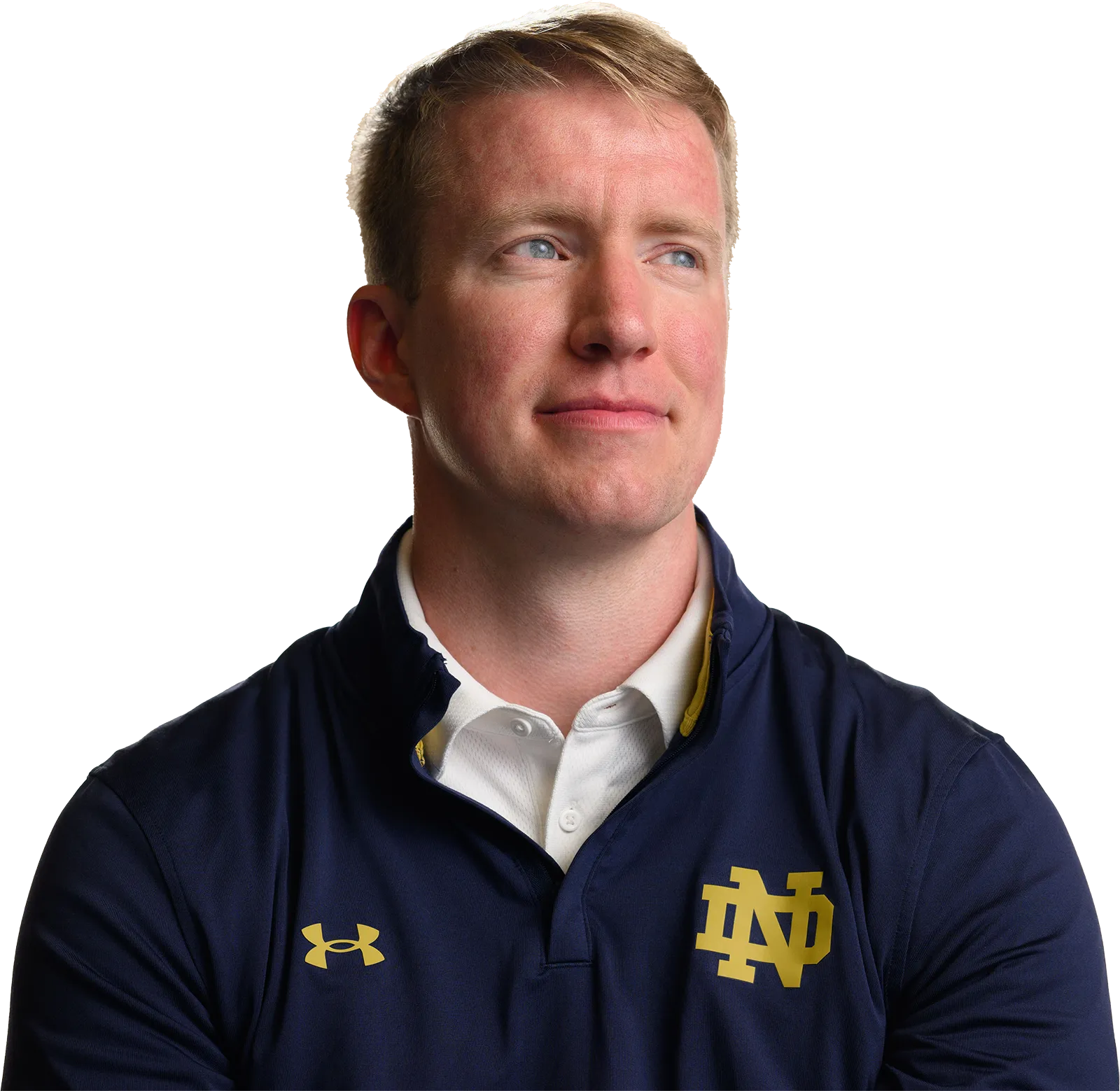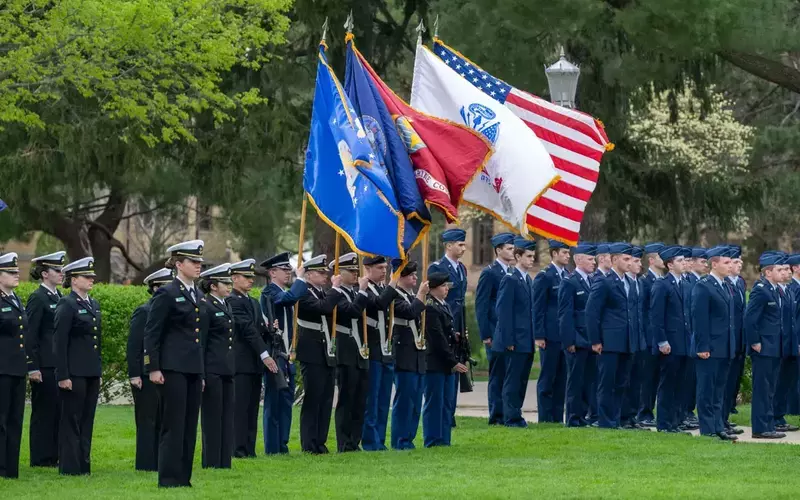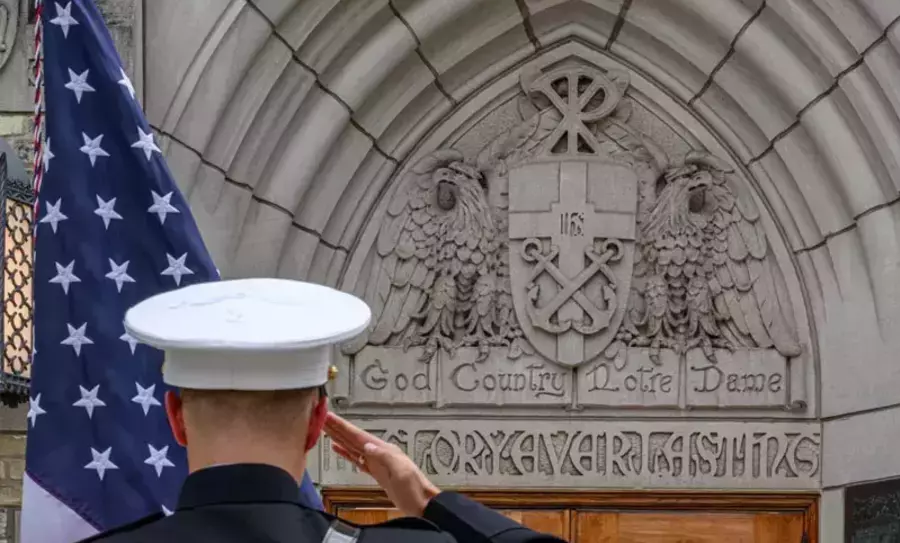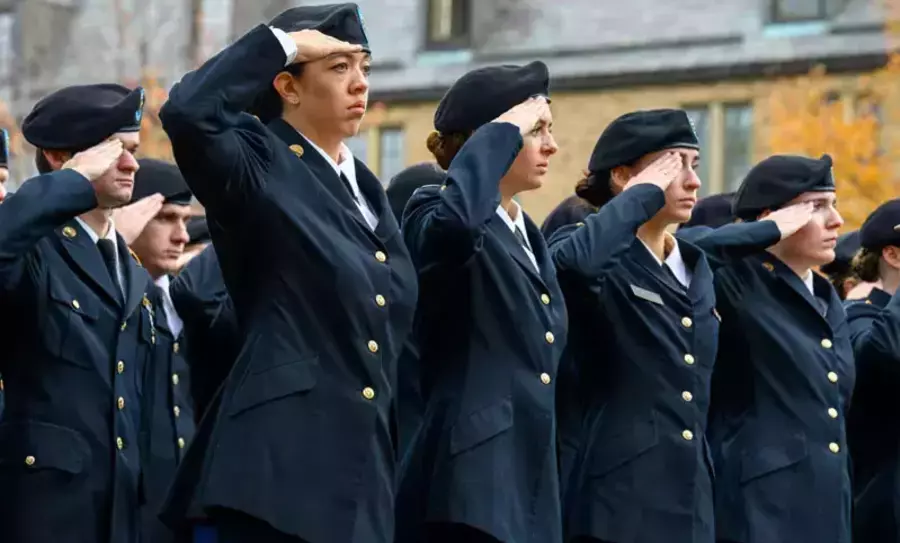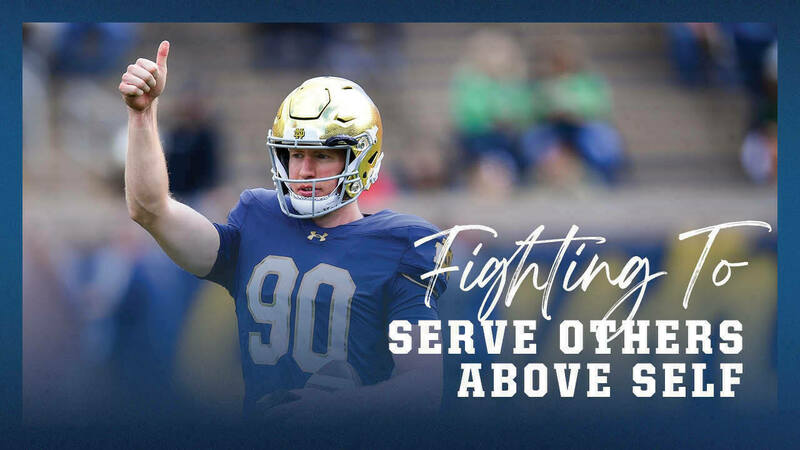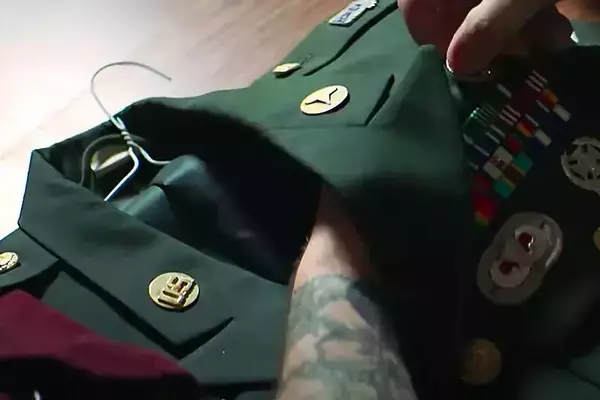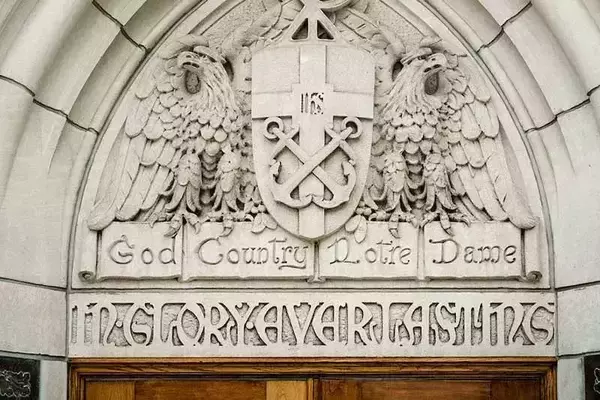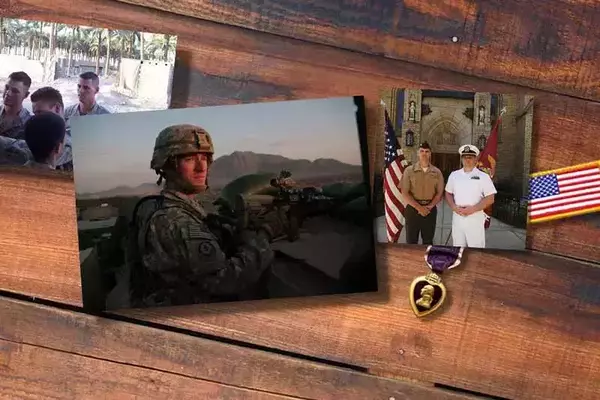In October 2022, Eric Goins, a US Army Signal Corps officer, was in Poland in the wake of Russia’s invasion of Ukraine. The communications officer had been deployed for almost eight months and was looking for his next assignment.
As he discerned whether his future was in the military, he decided to apply to Notre Dame’s Mendoza College of Business Master of Business Administration program. Upon receiving his acceptance in December, he threw a Hail Mary pass to Notre Dame’s football program: Could he be a walk-on to the team?
Goins had been a record-setting kicker as an undergraduate at the Citadel, a military college in South Carolina. He still holds the school record for field goals made. But he was now 30 and not a typical recruit. To further complicate things, because he was deployed, he couldn’t send current film to prove his skills, he said.
Goins turned his attention to the long process required to leave the military, and in July 2023, he was able to officially separate from active-duty service. He was due at Notre Dame just five days later.
Once he arrived for classes, he emailed the special teams assistant coach and asked if he could walk on in the spring. The response was positive.
En octubre de 2022, Eric Goins, un oficial del Cuerpo de Señales del Ejército de Estados Unidos, se encontraba en Polonia tras la invasión rusa de Ucrania. El oficial de comunicaciones había sido desplegado durante casi ocho meses y estaba esperando su próxima asignación.
Mientras discernía si su futuro estaba en el ejército, decidió postularse al programa de Maestría en Administración de Empresas de la Facultad de Negocios Mendoza de Notre Dame. Al recibir noticia de su aceptación, hizo un tiro de fe enviando un mensaje al programa de fútbol de Notre Dame: ¿Podría ser incorporado al equipo durante la temporada?
Goins había sido un pateador que estableció récords como estudiante en Citadel, una universidad militar en Carolina del Sur. Aún conserva el récord escolar de tiros de campo anotados. Pero ya tenía 30 años y no era una contratación normal. Para complicar aún más las cosas, debido a que estaba desplegado oficialmente, no podía enviar videos recientes para demostrar sus habilidades, dijo.
Goins centró su atención en el largo proceso necesario para salir del ejército y, en julio de 2023, pudo separarse oficialmente del servicio activo. Debía llegar a Notre Dame sólo cinco días después.
Una vez llegó para iniciar clases, le envió un correo electrónico al entrenador asistente de equipos especiales y le preguntó si podía incorporarse al equipo en la primavera. La respuesta fue afirmativa.
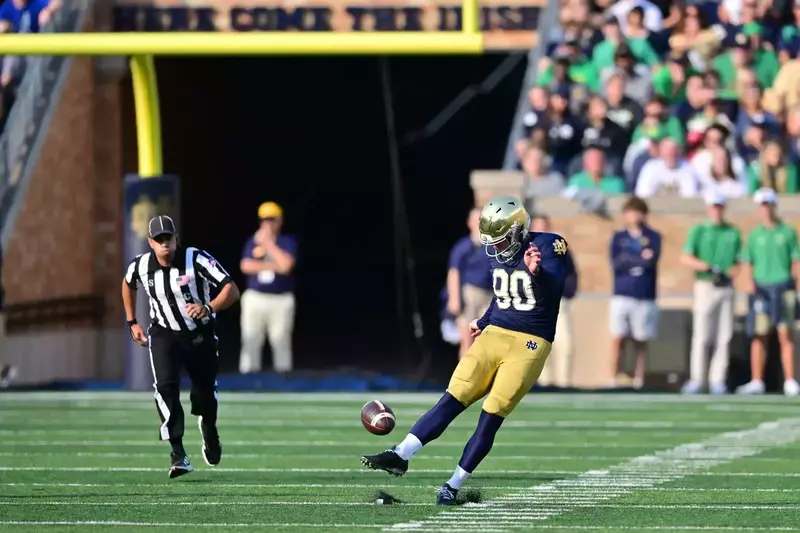
From Battle Field to Football Field
The rest of the story has played out on the field. Goins used his fifth year of eligibility to walk onto the Notre Dame squad as a graduate student. He has seen the field for kickoffs during games against Purdue, Stanford, Georgia Tech, Navy, Florida State and Virginia. But what he provides the team extends beyond the gridiron.
“An officer’s job is to coach, teach, and mentor, by providing purpose, direction, and motivation to soldiers. I feel like that’s one of my roles on the football team,” he said. “But also I have to learn just as much from everyone else right now, because I’m new to Notre Dame football, so they know more than me about the day-to-day stuff. But I can bring my outside perspective on a lot of things.”
Marcus Freeman, the Dick Corbett Head Football Coach and the son of an Air Force veteran, agreed that Goins brings a unique skill set to the roster. “I think there’s so many lessons that the US military truly develops . . . and number one is discipline, work ethic, a sense of selflessness, and being able to commit to something bigger than yourself.”
Del campo de batalla al campo de fútbol
El resto de la historia se ha desarrollado en el campo. Goins aprovechó su quinto año de elegibilidad para ingresar al equipo de Notre Dame como estudiante de posgrado. Ha estado en el campo esta temporada durante los juegos contra Purdue, Stanford, Georgia Tech, Navy, Florida State y Virginia. Pero lo que él aporta al equipo se extiende más allá del campo de juego.
“El trabajo de un oficial es entrenar, enseñar y orientar, brindando propósito, dirección y motivación a los soldados. Siento que ese es uno de mis roles en el equipo de fútbol”, dijo. “Pero también tengo que aprender mucho de los demás en este momento, porque soy nuevo en el fútbol de Notre Dame, así que ellos saben más que yo sobre las cosas del día a día. Pero puedo aportar mi perspectiva externa a muchas cosas”.
Marcus Freeman, entrenador principal de fútbol de Dick Corbett e hijo de un veterano de la Fuerza Aérea, estuvo de acuerdo en que Goins aporta un conjunto de habilidades únicas al plantel. “Creo que hay muchas lecciones que el ejército estadounidense realmente desarrolla... y lo primero es la disciplina, la ética laboral, un sentido de altruismo y la capacidad de comprometerse con algo más grande que uno mismo”.
Goins is not the only student veteran on campus. While Notre Dame’s strong ROTC programs have long been the heart of campus military involvement, there is a growing cadre of active-duty members and veterans on campus. According to Ken Heckel, the director of the Office of Military and Veterans Affairs, Notre Dame currently has just shy of 600 military-affiliated students. More than 130 have served or are currently serving, 33 of whom are in the MBA program, thanks in part to the MBA Military Veterans Club. Around 175 are military dependents whose parents or spouses have granted them education benefits from the US Department of Veterans Affairs. The remaining 280 are in the ROTC program and will go on to serve the nation in their respective branches.
Goins no es el único estudiante veterano en el campus. Si bien los sólidos programas de ROTC de Notre Dame han estado mucho tiempo en el corazón de la participación militar del campus, hay un grupo creciente de miembros en servicio activo y veteranos en el campus. Según Ken Heckel, director de la Oficina de Asuntos Militares y de Veteranos actualmente, Notre Dame tiene casi 600 estudiantes que son miembros del ejército. Más de 130 han prestado servicio o están prestando servicio actualmente, 33 de los cuales están cursando un programa de MBA, gracias en parte al Club de maestría para veteranos militares (MBA Military Veterans Club). Alrededor de 175 son dependientes militares cuyos padres o cónyuges les han otorgado beneficios educativos del Departamento de Asuntos de Veteranos de EE. UU. Los 280 restantes están en el programa ROTC y continuarán sirviendo a la nación en sus respectivos oficios.
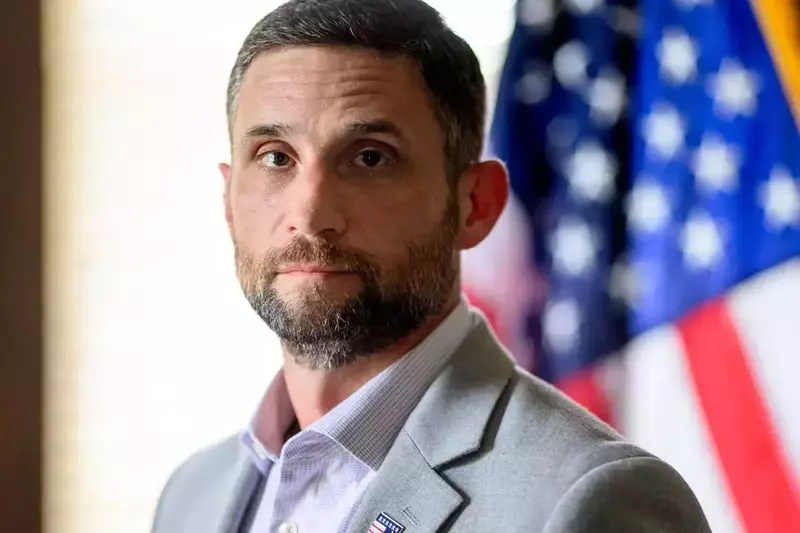
All told, the community is robust, and Heckel is working to formalize mentorship and host family programs to offer layers of support and connection. He noted that because most military members who come to Notre Dame are not the typical 18-year-old student, they may have unique challenges and needs, such as arriving with a family, and need different resources from a typical undergraduate.
“We don’t want them to get here on their own, make that life transition and not have a network of folks who understand their lived experiences to plug into,” Heckel said. “Formalizing that connection is important for us to welcome them to Notre Dame and make sure that they feel comfortable as part of the vibrant community that we have here, not just with other military-connected students, but with the broader student population as well.”
Heckel understands the transition firsthand. He is a 1996 Notre Dame alumnus and a retired lieutenant colonel in the United States Army. In addition to numerous combat deployments, he previously spent 10 years on the faculty and staff at West Point. Heckel acknowledged there are other universities with much larger military communities. But at Notre Dame, he said, the unique strength is the parallel missions.
“I can’t think of an institution that has a stronger connection to military service other than the academies,” he said. “It goes back to this common ethos of servant leadership, that our students here are called to serve others above self. That ethos creates the strongest mission alignment with military service.”
En general, la comunidad es sólida y Heckel está trabajando para formalizar programas de tutoría y familias anfitrionas para ofrecer diferentes niveles de apoyo y conexión. Señaló que, debido a que la mayoría de los miembros de fuerzas militares que llegan a Notre Dame no son los típicos estudiantes de 18 años, pueden tener desafíos y necesidades particulares, como el llegar con sus familias, y requerir recursos diferentes a los de un estudiante universitario típico de pregrado.
"No queremos que lleguen aquí solos, que hagan esa transición de vida y no tengan una red de personas que comprendan sus experiencias de vida a las que puedan recurrir", dijo Heckel. “Formalizar esa conexión es importante para que podamos darles la bienvenida a Notre Dame y asegurarnos de que se sientan cómodos como parte de la vibrante comunidad que tenemos aquí, no solo con otros estudiantes relacionados con el ejército, sino también con la población estudiantil en general”.
Heckel comprende la transición de primera mano. Es un ex alumno de Notre Dame de 1996 y un teniente coronel retirado del Ejército de los Estados Unidos. Además de numerosas misiones de combate, anteriormente pasó 10 años como profesor y miembro del personal en West Point. Heckel reconoció que hay otras universidades con comunidades militares mucho más grandes. Pero en Notre Dame, dijo, la fortaleza única son las misiones paralelas.
“No puedo pensar en una institución que tenga una conexión más fuerte con el servicio militar que las academias”, dijo. “Se remonta a este espíritu común de liderazgo de servicio, que nuestros estudiantes aquí están llamados a servir a los demás por encima de sí mismos. Ese espíritu crea la alineación más fuerte de la misión con el servicio militar”.
While Notre Dame's ROTC programs, pictured here during the annual Pass-in-Review, have long been the heart of campus military involvement, veterans and active-duty members are a growing part of campus's military community.
Because military service members innately understand and live out Notre Dame’s mission to serve the common good, the University can serve as an important and familiar stepping stone for those transitioning out of active-duty service, Heckel said. And, he added, Notre Dame doesn’t just welcome them out of charity—those service members uniquely deepen the community with lived experiences and learned traits such as grit, patience, leadership, determination, and trust.
“I think it’s important for Notre Dame to be a place that they see as welcoming to them and not just accepting of them,” he said. “We want our student veterans to know that Notre Dame is a welcoming place, not simply because we appreciate their service, but because we value how much that service and experience brings to our community.”
That welcome mat has been appealing. Notre Dame has a rare number of active-duty doctoral students who will go on to lead battalions or brigades upon graduation. Heckel believes that, along with an impressive degree, they can also take with them Notre Dame values.
“These are senior military officers who are going to be leading significant organizations in the future that Notre Dame is educating,” he said.
The same applies to those leaving the military entirely. The door is open to those individuals too, Heckel emphasized.
“It’s important for Notre Dame to be a place that veterans can see as a meaningful opportunity for them to transition from a career in the military to whatever path they aspire to pursue upon graduation.”
Debido a que los miembros del servicio militar comprenden y viven de manera innata la misión de Notre Dame de servir al bien común, la Universidad puede servir como un trampolín importante y familiar para aquellos que abandonan el servicio activo, dijo Heckel. Y, agregó, Notre Dame no los recibe por caridad: esos miembros del servicio enriquecen la comunidad de manera única con experiencias vividas y rasgos aprendidos como coraje, paciencia, liderazgo, determinación y confianza.
"Creo que es importante que Notre Dame sea un lugar que los reciba con los brazos abiertos, y no que simplemente los acepte", dijo. “Queremos que nuestros estudiantes veteranos sepan que Notre Dame es un lugar acogedor, no solo porque apreciamos su servicio, sino porque valoramos lo mucho que ese servicio y experiencia aportan a nuestra comunidad”.
Ese reconocimiento, a manera de alfombra de bienvenida, ha resultado atractivo. Notre Dame tiene un número poco común de estudiantes de doctorado en servicio activo que pasarán a liderar batallones o brigadas después de graduarse. Heckel cree que, además de un título académico impresionante, también pueden llevarse consigo los valores de Notre Dame.
“Se trata de altos oficiales militares que en el futuro dirigirán importantes organizaciones que Notre Dame está educando”, afirmó.
Lo mismo se aplica a aquellos que abandonan el ejército por completo. La puerta también está abierta para estas personas, enfatizó Heckel.
“Es importante que Notre Dame sea un lugar que los veteranos puedan ver como una oportunidad significativa para hacer la transición de una carrera en el ejército al camino que aspiren seguir después de graduarse”.
As for Goins, he is working toward a dual MBA and Master of Global Affairs (MGA) degree. Foreign language proficiency is encouraged in the program, so Goins is, once again, building on his military experience. He learned some German while stationed in Germany and is working toward fluency. Goins is also a Sorin Fellow in Notre Dame’s de Nicola Center for Ethics and Culture. The fellows are offered mentors and role models, discernment opportunities, and grant funding. In turn, the fellows serve as witnesses to human dignity, freedom, and the common good on campus and beyond. He has spread a wide net with the goal of best discerning what is next for him.
“Ultimately, I want to one day resume serving our country in some capacity — just not in the military anymore,” Goins said.
This summer, Goins will work on a project for an MGA program called iLab. He will travel to cities across North America, South America, and England to promote urban biodiversity. He is looking for what his postgraduate plans will be.
En cuanto a Goins, está trabajando para lograr un programa doble, de MBA y de Maestría en Asuntos Globales (MGA). En el programa se fomenta el dominio de idiomas extranjeros, por lo que Goins, una vez más, aprovecha su experiencia militar. Aprendió algo de alemán mientras estuvo asignado en Alemania y está trabajando para hablarlo con fluidez. Goins también es un Becario Sorin en el Centro de Ética y Cultura de Nicola de Notre Dame. A los becarios se les ofrecen mentores y modelos a seguir, oportunidades de discernimiento y financiación de subvenciones. A su vez, los becarios dan testimonio de la dignidad humana, la libertad y el bien común en el campus y más allá. Ha tendido una amplia red con el objetivo de discernir mejor lo que le espera en el futuro.
“En última instancia, quiero algún día volver a servir a nuestro país de alguna manera, pero ya no en el ejército”, dijo Goins.
Este verano, Goins trabajará en un proyecto para un programa de de la Maestría en Asuntos Globales (MGA) llamado iLab. Viajará a ciudades de América del Norte, América del Sur e Inglaterra para promover la biodiversidad urbana. Está considerando cuáles serán sus planes de posgrado.
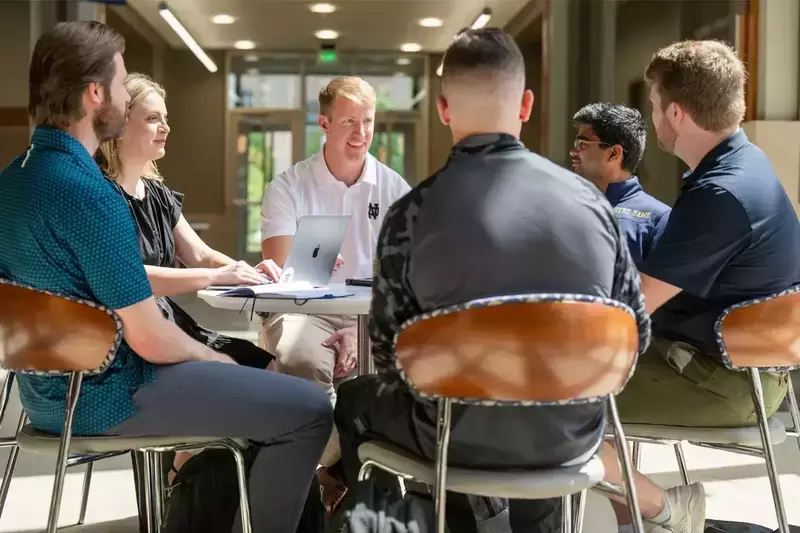
Credits
Writer: Tara Hunt McMullen
Photographers: Matt Cashore and Barbara Johnston
Créditos
Escritor: Tara Hunt McMullen
Fotos: Matt Cashore y Barbara Johnston
